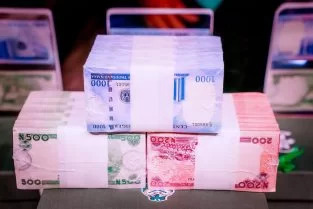The Central Bank of Nigeria (CBN) has warned that those abusing the naira were liable to go to jail.
The apex bank said the law banning the “spraying” and the stepping on the naira, especially at social gatherings, is still in force and that offenders are liable to six months’ imprisonment or a fine of N50,000.
Principal Manager, Currency Operations Department, Central Bank of Nigeria (CBN), Ms Ngozi Etim, said the apex bank is working with the police, the FIRS, the EFCC and the Nigerian Financial Intelligence Unit to curb the abuse.
She condemned the “spraying” of money in public, adding that the envelope remained the best and acceptable means of extending goodwill at events.
“Money should not be squeezed but be put in envelopes. Oil should not be allowed to touch money; keep it neat like you keep your clothes.
Etim stressed that the naira remains the pride of the nation and must be kept lean at all times.
The CBN has declared that anybody caught abusing the naira would be punished.
Source: CBN goes tough on Naira abuse – StocksWatch (stocksng.com)












